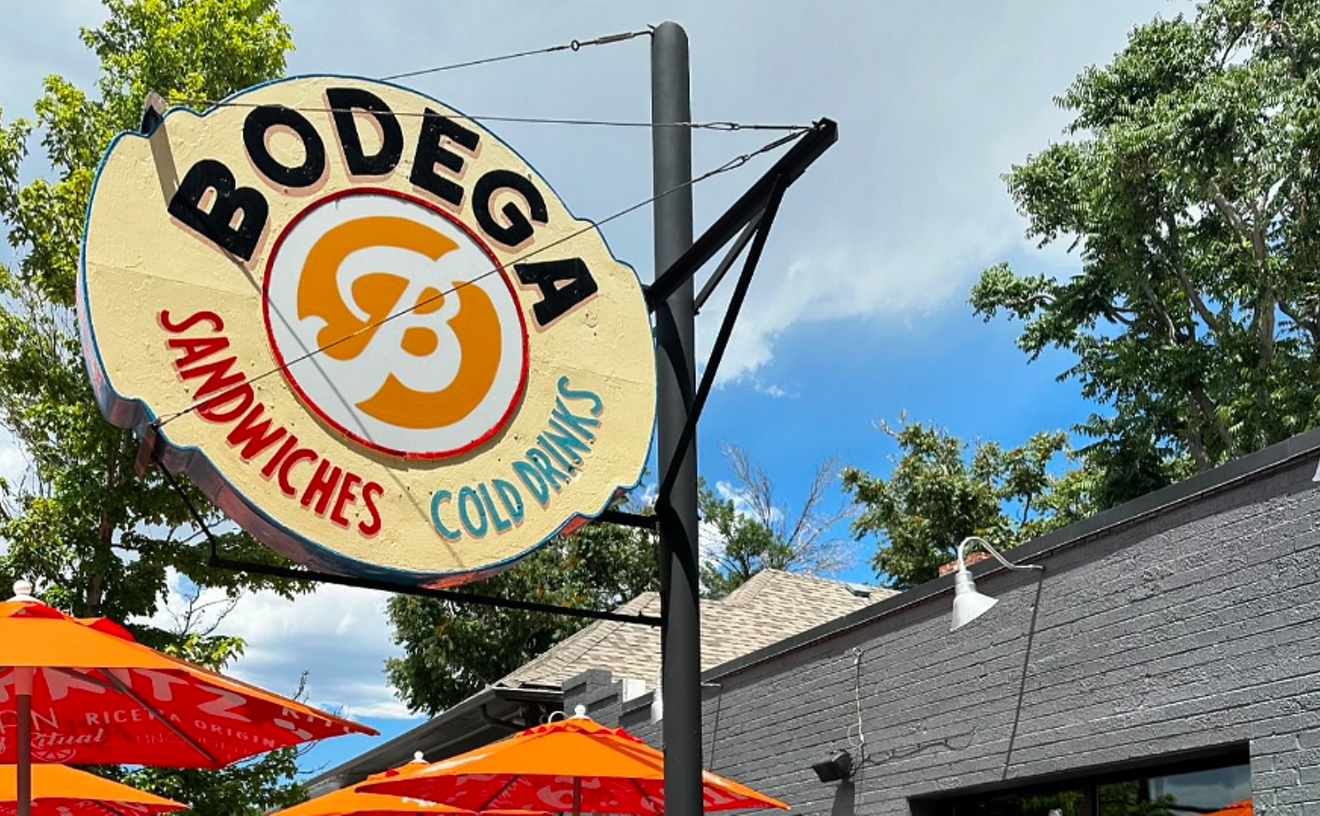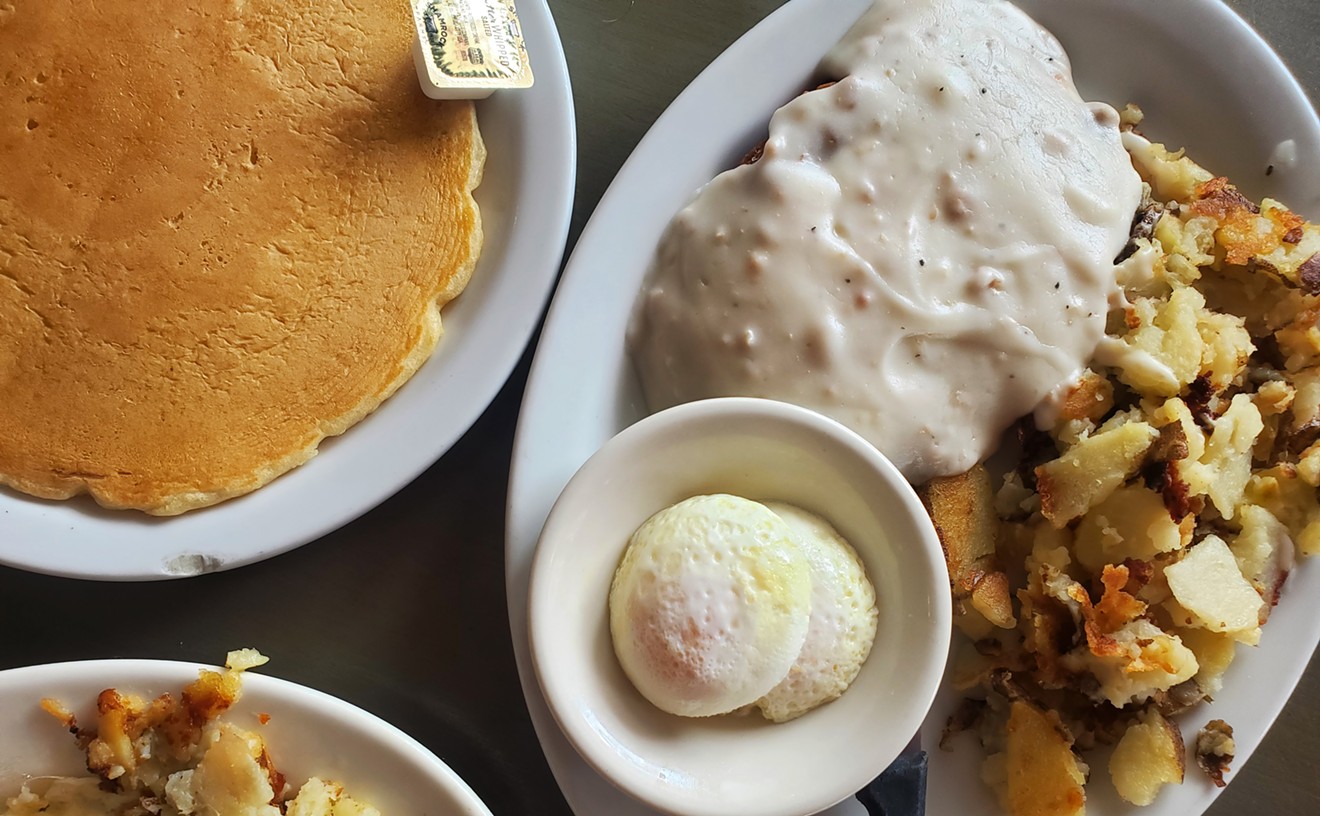There's a grill in the middle of the table at Silla Korean BBQ in Aurora, and that's a little intimidating. Not only is the menu filled with unfamiliar names and descriptions, but the rig raises the concern that you'll have to cook those unfamiliar dishes properly just so you can eat dinner. But ignore all that, and instead apply a little creative thinking to the cluster of small white bowls filled with orange, green and cream salads and pickles. Because Korean barbecue isn't so different from American barbecue as it's practiced in back yards throughout the U.S. on every weekend that isn't a complete blizzard or washout.
Let's start with those small white bowls, called banchan, each containing a spoonful of some sort of vegetable in sauce. Some of them might be condiments, some might be appetizers — it's hard to say. Now imagine a picnic table burgeoning with bowls of baked beans, coleslaw, potato salad, pickle relish, sweet pickles, dill pickles, butter pickles, macaroni salad, Jell-o salad in its many Midwestern forms, and — well, you get the picture. There are dozens of dishes that are perfectly acceptable sidekicks to burgers, hot dogs, ribs and pork shoulder, and no shortage of accoutrements meant to be heaped on buns or slathered on meats. Although the names of the various banchan may escape recognition, a quick nibble of each one is enough to give a hint of its purpose on the table. A chunky, peanuty sauce is clearly meant as a condiment, while soft cubes of sweet potato in a honey-sweet syrup seem well-suited as a contrast to the salty, spicy marinades of the meats. There's even a straight-up potato salad in mild mayonnaise that's instantly recognizable, even if out of context.
Next comes the meat. Beef and pork are common, whether simply seasoned or heavily marinated, on the bone or off. We selected daegi boolgogi (strips of pork slathered in a brick-red marinade) and thin-sliced duck breast coated in a marinade of a slightly different shade of red. The server used kitchen tongs to lay a few slices of each on our grill, first rubbing a raw onion on its blistering-hot surface to give it a little seasoning (a trick I'll have to remember for grilling at home). As the meat cooked (our server flipped a couple of pieces to show us what half-way-done looked like before leaving us to our own devices), we snacked on an appetizer of oyster pancakes, something I wouldn't recommend as part of the barbecue experience. Not that the little pancakes (more like mini-omelettes, each with a single cooked oyster in the center) were poorly made, but the combination of egg and oyster isn't particularly pleasant. (This was one of the few dishes I've ever actively disliked during my Ethniche series.)
But an appetizer really isn't needed with all of the bites that come with an order of barbecue. Along with the banchan, a basket of green leaf lettuce is part of the package — to be used as wraps for the meat. And small bowls of sticky rice are provided to absorb the salty, spicy and funky flavors.
Once the meats are cooked (and a new round of meat laid on the grill), the assembly of the wraps can begin. Here the analogy is to the building of a burger or a pulled pork sandwich. A foreign visitor dropped in the middle of a Colorado family cookout for the first time might be a little bewildered by ketchup, mustard, mayonnaise, relish, sliced tomatoes and onions, cheese and other toppings, but a few tastes and some friendly suggestions would be enough guidance to build something to individual preference. The two types of kimchi provided by Silla were a little bold and powerful to accent the equally spicy grilled meats, but they were also great with plain white rice. Strands of pickled radish and watercress seemed perfect when laid alongside pork or duck in a lettuce wrap.
When the briny,funky fermented flavors became overpowering, a bite of sliced celery in a creamy sauce balanced the palate, and a simple iceberg-lettuce salad topped with what was clearly Thousand Island dressing cooled the tongue. Sips of mildly alkaline soju (a distilled rice liquor diluted in the bottle to about 20 percent alcohol) also kept all the disparate flavors in check.
Around the restaurant, groups of Korean men in their forties and fifties sat in booths sharing beer and soju while tending their tabletop grills. It was a familiar scene, down to the polo shirts and khaki pants of the men, who had perhaps been golfing together earlier in the day, or shepherding their kids to soccer games, or taking advantage of the warm weather to get in a little yardwork. Cooking together over cold drinks is clearly a universal experience, and one that Silla makes easy by doing the prep-work for you. And if you're just not into the idea of cooking your own food in a restaurant, Silla will do that for you, too, grilling your selection in the kitchen while you relax in your booth over drinks and appetizers (of anything but oyster pancakes).
[
{
"name": "Air - MediumRectangle - Inline Content - Mobile Display Size",
"component": "12017618",
"insertPoint": "2",
"requiredCountToDisplay": "2",
"watchElement": ".fdn-content-body",
"astAdList": [
{
"adType": "rectangle",
"displayTargets": "mobile"
}
]
},{
"name": "Editor Picks",
"component": "17242653",
"insertPoint": "4",
"requiredCountToDisplay": "1",
"watchElement": ".fdn-content-body",
"astAdList": [
{
"adType": "rectangle",
"displayTargets": "desktop|tablet"
},{
"adType": "rectangle",
"displayTargets": "desktop|tablet|mobile"
}
]
},{
"name": "Inline Links",
"component": "18838239",
"insertPoint": "8th",
"startingPoint": 8,
"requiredCountToDisplay": "7",
"maxInsertions": 25
},{
"name": "Air - MediumRectangle - Combo - Inline Content",
"component": "17261320",
"insertPoint": "8th",
"startingPoint": 8,
"requiredCountToDisplay": "7",
"maxInsertions": 25,
"watchElement": ".fdn-content-body",
"astAdList": [
{
"adType": "rectangle",
"displayTargets": "desktop|tablet"
},{
"adType": "rectangle",
"displayTargets": "desktop|tablet|mobile"
}
]
},{
"name": "Inline Links",
"component": "18838239",
"insertPoint": "8th",
"startingPoint": 12,
"requiredCountToDisplay": "11",
"maxInsertions": 25
},{
"name": "Air - Leaderboard Tower - Combo - Inline Content",
"component": "17261321",
"insertPoint": "8th",
"startingPoint": 12,
"requiredCountToDisplay": "11",
"maxInsertions": 25,
"watchElement": ".fdn-content-body",
"astAdList": [
{
"adType": "leaderboardInlineContent",
"displayTargets": "desktop|tablet"
},{
"adType": "tower",
"displayTargets": "mobile"
}
]
}
]











